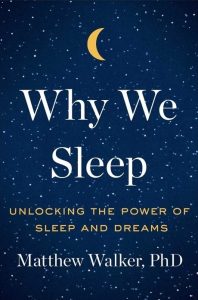Introduction
In this seventh part of my multi-part series, “Definitive Classics: Influential Books on Health in the Last 10 Years,” I review “Why We Sleep” by Matthew Walker.
Sleep, an indispensable aspect of human existence, remains a captivating enigma that has fascinated scientists, philosophers, and curious minds for centuries. It is a state of being that occupies a significant portion of our lives, consuming roughly one-third of our time.
In his trailblazing book, “Why We Sleep,” esteemed sleep scientist Matthew Walker PhD embarks on a journey to unravel the mysteries of slumber, shedding light on the vital importance of sleep and its profound impact on our physical and mental well-being. Through meticulous research and engaging storytelling, Walker unveils the secrets hidden within the realm of dreams.
The Crucial Role of Sleep: Uncovering a Multifaceted Wonder
Sleep is far more than a passive state of unconsciousness; it is a dynamic and intricate process that plays an indispensable role in our lives. Walker’s book masterfully explores the extensive research on sleep, emphasizing its crucial contribution to our overall health and functioning.
One of the primary functions of sleep is to facilitate physical restoration and healing. During sleep, our bodies undergo a remarkable array of reparative processes at the cellular level. Tissues are repaired, muscles are restored, and the immune system is bolstered. Inadequate sleep, therefore, leaves us vulnerable to a host of health issues, including obesity, diabetes, cardiovascular disease, and a weakened immune system.
In addition to its physical benefits, sleep profoundly influences our mental and emotional well-being. Walker illuminates the pivotal role sleep plays in cognitive functions such as memory, learning, attention, and creativity. While we sleep, the brain processes and consolidates newly acquired information, facilitating learning and memory formation. Conversely, a lack of sleep impairs these cognitive processes, hindering our ability to retain information and make optimal decisions.
The Dangers of Sleep Deprivation: Unveiling the Hidden Consequences
In our modern, fast-paced society, sleep is often undervalued and sacrificed for the sake of productivity or leisure activities. However, Walker brings attention to the alarming consequences of sleep deprivation that extend far beyond feeling fatigued. A chronic lack of sleep wreaks havoc on our physical and mental well-being, posing a significant threat to our overall health.
When we consistently deprive ourselves of sufficient sleep, we set in motion a cascade of adverse effects. The risks of obesity and weight gain increase due to disruptions in appetite-regulating hormones, leading to overeating and unhealthy food choices. The relationship between insufficient sleep and diabetes is also well documented, as it interferes with glucose metabolism and insulin sensitivity.
Moreover, sleep deprivation compromises cardiovascular health. Research indicates that those who consistently experience inadequate sleep are at a higher risk of developing hypertension, coronary heart disease, and stroke. The body’s regulatory systems become imbalanced, leading to increased inflammation and elevated blood pressure.
In the realm of mental health, sleep deprivation serves as a significant contributor to the development and exacerbation of mood disorders such as depression and anxiety. The emotional centers of the brain become hypersensitive, amplifying negative emotions and reducing emotional resilience. Furthermore, inadequate sleep impairs our ability to regulate emotions effectively, leading to heightened reactivity and irrationality.

The Science Behind Sleep: Unveiling the Intricacies of Slumber
With meticulous attention to detail, Walker unravels the complex science behind sleep1, guiding readers through the stages and processes that govern our nightly rest. From the symphony of electrical brainwaves to the delicate interplay of hormones, “Why We Sleep” delves into the intricate mechanisms that orchestrate our slumber.
Our sleep is composed of cycles, with each cycle consisting of distinct stages. Navigating these stages, we transition between light sleep, deep sleep, and the captivating dream-filled state of Rapid Eye Movement (REM) sleep.2 Walker’s book provides a comprehensive understanding of these stages, shedding light on their individual functions and contributions to our overall well-being.
During non-REM sleep3, our bodies engage in essential restorative processes. It is a time when our muscles relax, blood pressure drops, and the release of growth hormones facilitates tissue repair. This stage is particularly crucial for physical recovery and rejuvenation, as it allows our bodies to heal and replenish themselves.
As we progress into REM sleep, the brain becomes a theater of vivid and immersive dreams. Walker explores the intriguing phenomenon of REM sleep and its significance in memory consolidation, emotional processing, and creativity. REM sleep is the stage in which our brains engage in a dance of neural activity, forging connections between newly acquired information and pre-existing knowledge. This process not only strengthens memories but also enhances our capacity to learn and comprehend.
The Power of Napping: Rediscovering Rest in Short Breaks
Contrary to popular belief, napping is not a sign of laziness but a powerful tool that can enhance our overall well-being and productivity. Walker devotes considerable attention to the benefits of napping and its ability to recharge and rejuvenate the mind.
Research shows that brief daytime naps, ranging from a few minutes to around an hour, can significantly improve alertness, cognitive function, and creativity. Napping serves as a refreshing break, allowing the brain to recover from mental fatigue and enhancing our ability to concentrate and solve problems efficiently. Moreover, naps have been linked to improved mood and emotional regulation, providing a natural boost to our psychological well-being.
Naps also offer a valuable solution to counteract the effects of inadequate nighttime sleep. If we find ourselves running on sleep debt due to a late night or a restless evening, a well-timed nap can help restore our energy levels and mitigate the negative consequences of sleep deprivation. Walker’s exploration of napping serves as a reminder of the importance of honoring our body’s need for rest, even in the midst of busy schedules and demanding lifestyles.
Understanding Sleep Disorders: Unveiling the Challenges and Solutions
In “Why We Sleep,” Walker turns his attention to the prevalence and impact of sleep disorders that plague millions of individuals worldwide. Insomnia, sleep apnea, restless leg syndrome, and other sleep-related conditions can disrupt our sleep patterns, leaving us feeling fatigued and impairing our overall well-being.
Insomnia, characterized by difficulty falling asleep or staying asleep, can have a profound impact on our quality of life. Walker delves into the causes of insomnia and explores various treatment options, including cognitive-behavioral therapy for insomnia4 (CBT-I), which has shown promising results in addressing the root causes of sleep disturbances.
Sleep apnea, a disorder in which breathing is repeatedly interrupted during sleep, poses significant health risks if left untreated. Walker sheds light on the consequences of sleep apnea and highlights the importance of seeking medical intervention to alleviate symptoms and reduce associated health risks.
Restless leg syndrome, characterized by an irresistible urge to move the legs, particularly during periods of inactivity or at night, can disrupt sleep and cause discomfort. Walker explores the intricacies of this condition and offers insights into potential management strategies to alleviate its impact on sleep quality.
By providing a comprehensive understanding of sleep disorders and their potential solutions, Walker equips readers with valuable knowledge to seek appropriate medical advice and regain control over their sleep health.
Moving on, we will continue the exploration of “Why We Sleep” by delving deeper into the impact of sleep on memory, creativity, and emotional well-being, as well as discussing the societal factors that contribute to sleep deprivation. Stay tuned for an enlightening continuation of this captivating journey into the world of slumber.

Exploring the Depths of Memory and Creativity
In the realm of memory and learning, sleep plays a remarkable role. Walker delves into the intricate relationship between sleep and memory consolidation, unraveling how the brain processes and solidifies new information during slumber. Through a process called memory reactivation, sleep reactivates and strengthens the neural connections associated with recently acquired knowledge, enhancing our ability to retain and retrieve information.
Furthermore, Walker sheds light on the fascinating phenomenon of memory reorganization during sleep. As we sleep, our brains engage in a sophisticated dance of neural activity, rearranging and reorganizing memories to extract their essential elements and discard irrelevant details. This process allows us to extract meaningful insights, discern patterns, and form creative associations between different pieces of information.
Creativity, often viewed as an elusive and mysterious trait, finds its roots in the realm of sleep. Walker explores the profound impact of sleep on creative thinking and problem-solving. During REM sleep, the brain exhibits heightened activity in regions associated with creative thinking, leading to the emergence of novel ideas and unique solutions. Walker’s exploration of the connection between sleep and creativity unveils the hidden potential that lies within our slumbering minds.
Socio-Cultural Factors: Unveiling the Epidemic of Sleep Deprivation
In the fast-paced, hyper-connected world we live in, sleep often takes a backseat to productivity, work demands, and the constant stimulation of technology. Walker addresses the societal factors that contribute to the pervasive issue of sleep deprivation, emphasizing the importance of prioritizing sleep in our daily lives.
The advent of artificial lighting, the 24/7 availability of entertainment and work-related activities, and the increasing demands of a globalized society have disrupted our natural sleep patterns. Walker exposes the consequences of this societal shift as we find ourselves caught in a cycle of sleep deprivation that compromises our physical and mental well-being.
The negative impact of sleep deprivation extends beyond the individual level; it permeates our communities and affects society as a whole. Impaired sleep has been linked to reduced productivity, increased workplace accidents, and compromised decision-making abilities. Moreover, sleep deprivation poses a significant public health concern, contributing to the rising prevalence of chronic diseases and mental health disorders.
Walker’s examination of the socio-cultural factors that perpetuate sleep deprivation serves as a call to action, urging individuals and society at large to recognize the critical importance of sleep and make informed choices to prioritize adequate rest.
Embracing the Power of Sleep
“Why We Sleep” has illuminated the profound impact of sleep on memory, creativity, and our societal well-being. Walker’s meticulous research and engaging narrative have unveiled the hidden potential that lies within our slumbering minds, urging us to reevaluate our relationship with sleep.
By understanding the vital role sleep plays in our physical health, cognitive function, and emotional well-being, we are empowered to make informed choices to safeguard our sleep health. From implementing healthy sleep habits and creating optimal sleep environments to advocating for policies that prioritize rest, we can reclaim the power of sleep and harness its transformative benefits.
Now let’s delve into the connection between sleep and emotional well-being, exploring how sleep influences our emotional regulation, resilience, and overall mental health. Prepare to embark on a captivating journey through the intricacies of the slumbering mind, as we continue our exploration of “Why We Sleep” by Matthew Walker.

The Emotional Landscape of Sleep
In “Why We Sleep,” Matthew Walker uncovers the intricate interplay between sleep and our emotional well-being. Emotions and sleep are deeply intertwined, with sleep playing a crucial role in regulating our emotional experiences, enhancing resilience, and promoting optimal mental health.
Walker explores how a lack of sleep amplifies negative emotions, leading to heightened reactivity, irritability, and an overall reduced ability to cope with stressors. Sleep deprivation disrupts the delicate balance of emotional regulation, making it more challenging to recognize, understand, and effectively manage our emotions.
The Impact on Social Relationships
Sleep deprivation impairs the brain’s ability to accurately interpret social cues, contributing to a misreading of emotions in others. This can lead to strained relationships and interpersonal difficulties. Walker emphasizes that prioritizing sufficient sleep is vital not only for our individual well-being but also for fostering healthy social connections.
Establishing a Consistent Sleep Schedule
In “Why We Sleep,” Matthew Walker not only unravels the mysteries of sleep but also equips readers with practical strategies to improve sleep quality. Recognizing the significance of sleep hygiene, Walker offers evidence-based recommendations to optimize our sleep routines and create an environment conducive to restful slumber.
Establishing a consistent sleep schedule is crucial for regulating our body’s internal clock, known as the circadian rhythm. By going to bed and waking up at the same time every day, we align our sleep patterns with our natural biological rhythms, promoting more restorative sleep.
Creating a Sleep-Friendly Environment
Creating a sleep-friendly environment is another essential aspect of improving sleep quality. Walker suggests keeping the bedroom cool, dark, and quiet, eliminating distractions such as electronic devices, and reserving the bedroom primarily for sleep and intimacy. Additionally, adopting relaxation techniques before bedtime, such as reading or practicing meditation, can help calm the mind and prepare the body for sleep.
The Role of Physical Activity in Promoting Healthy Sleep
Walker also emphasizes the importance of regular physical activity in promoting healthy sleep. Engaging in moderate exercise during the day has been shown to enhance sleep quality, reduce sleep latency (the time it takes to fall asleep), and increase overall sleep duration.
Cognitive-Behavioral Therapy for Insomnia (CBT-I)
In cases where sleep difficulties persist, Walker discusses the potential benefits of cognitive-behavioral therapy for insomnia (CBT-I), a structured and evidence-based therapeutic approach that targets the root causes of sleep disturbances. CBT-ICognitive-Behavioral Therapy for Insomnia: An Effective and Underutilized Treatment for Insomnia focuses on modifying negative sleep-related thoughts, implementing relaxation techniques, and establishing healthy sleep habits.
CBT-I is a structured therapeutic approach that addresses the underlying causes of insomnia and promotes healthier sleep habits. It involves techniques such as identifying and challenging negative sleep-related thoughts, implementing relaxation exercises, and developing a consistent sleep routine. CBT-I has demonstrated efficacy in improving sleep quality and reducing insomnia symptoms without the need for medication.

Why We Sleep: Matthew Walker
By incorporating these strategies into our daily lives, we can embark on a journey towards improved sleep health and overall well-being. Walker’s comprehensive guidance empowers us to take an active role in optimizing our sleep, unlocking the potential for improved emotional regulation, enhanced interpersonal connections, and a greater sense of overall wellness.
As we delve deeper into the emotional landscape of sleep, Walker’s insights shed light on the intricate dance between sleep and emotional regulation. By recognizing the crucial role that sleep plays in maintaining emotional balance, we gain a deeper understanding of the importance of prioritizing restful slumber in our lives.
Emotional Regulation
The delicate dance of emotional regulation during sleep involves a complex interplay between various brain regions and neurotransmitters. Sleep facilitates the processing and integration of emotional experiences, allowing us to adaptively respond to challenges and regulate our emotional responses. Walker’s research emphasizes that sufficient sleep enables us to approach life’s ups and downs with greater resilience and emotional stability.
Furthermore, the impact of sleep extends beyond our internal emotional landscape to our interpersonal connections. Sleep deprivation not only impairs our ability to accurately perceive and interpret others’ emotions but also affects our own emotional expression and communication. This can lead to misunderstandings, conflicts, and strained relationships.
The Impact of Sleep
By recognizing the profound impact of sleep on our emotional well-being and social interactions, we can begin to prioritize and cultivate healthy sleep habits. The strategies outlined by Walker provide practical tools to enhance sleep quality, ultimately leading to improved emotional regulation and more fulfilling relationships.
Moving forward, the exploration of strategies for enhancing sleep quality offers actionable steps we can take to optimize our sleep routines and create an environment conducive to restful slumber. Walker’s recommendations are rooted in scientific evidence and aimed at aligning our habits with our body’s natural sleep-wake cycle.
Sleep Schedule
Establishing a consistent sleep schedule is a fundamental aspect of sleep hygiene. By going to bed and waking up at the same time every day, we synchronize our internal body clock and promote a more regular sleep pattern. This consistency reinforces the natural rhythm of sleep and supports the body’s ability to initiate and maintain restorative sleep.
Sleep-Friendly Environment
Creating a sleep-friendly environment is equally crucial for maximizing sleep quality. Designating the bedroom as a sanctuary of rest and relaxation involves minimizing external disruptions such as noise and light, as well as optimizing the temperature and comfort of the sleep environment. Implementing relaxation techniques, such as reading or practicing mindfulness, can further signal the body and mind to unwind before sleep.
Physical Activity
Physical activity also plays a pivotal role in promoting healthy sleep. Engaging in regular exercise during the day can enhance sleep quality, reduce sleep latency, and increase overall sleep duration. However, it is important to note that vigorous exercise close to bedtime may have an activating effect on the body and interfere with sleep. Therefore, it is recommended to complete exercise sessions earlier in the day to allow sufficient time for the body to wind down before sleep.
By integrating these strategies into our daily lives, we empower ourselves to take control of our sleep health and reap the benefits of improved emotional well-being and overall functioning. Matthew Walker’s “Why We Sleep” serves as a valuable resource, guiding us towards a better understanding of the crucial role that sleep plays in shaping our emotional landscape and providing practical tools for achieving restorative slumber.

The Power of Sleep: A Gateway to Optimal Health
As we approach the conclusion of our exploration into “Why We Sleep,” Matthew Walker emphasizes the paramount importance of sleep in achieving and maintaining optimal health. Sleep acts as a powerful gateway, providing numerous physical and cognitive benefits that are essential for our well-being.
The Physical Benefits of Sleep
Sleep is a critical component of our body’s restorative processes, enabling the rejuvenation and repair of various physiological systems. Walker highlights the vital role that sleep plays in supporting our immune system, reducing inflammation, and promoting cardiovascular health.
Adequate sleep is closely linked to improved immune function, enhancing our body’s ability to fight off infections and diseases. During sleep, our immune system releases essential proteins called cytokines that help regulate immune responses and promote healing.
Furthermore, sleep contributes to cardiovascular health by regulating blood pressure and reducing the risk of heart disease. Chronic sleep deprivation has been associated with an increased risk of hypertension, heart attacks, and strokes. Walker’s research underscores the importance of prioritizing sleep as a means of safeguarding our cardiovascular well-being.
The Cognitive Benefits of Sleep
In addition to its physical advantages, sleep profoundly impacts our cognitive abilities, including attention, memory, and creativity. Walker elucidates how a well-rested mind operates at its full potential, leading to improved concentration, enhanced learning, and better problem-solving skills.
Sleep plays a crucial role in memory consolidation, as it allows the brain to organize and solidify newly acquired information. Walker explains that during sleep, the brain transfers memories from temporary storage areas to long-term storage, promoting better retention and recall.
Sleep fosters creativity by facilitating flexible thinking, original ideas, and innovative problem-solving. The brain engages in a process of “associative thinking” during sleep, forging connections between seemingly unrelated concepts and fostering the emergence of novel insights.
Unlocking the Secrets of Dreams
In the final chapters of “Why We Sleep,” Walker embarks on an exploration of the enigmatic world of dreams. Dreams have fascinated humans for centuries, and Walker offers insights into their purpose and the potential meanings behind them.
The Purpose of Dreams
Dreams, particularly those experienced during REM sleep, serve a multitude of purposes. Walker suggests that dreams may play a role in emotional regulation, providing an opportunity for the brain to process and integrate challenging or traumatic experiences.
Dreams also serve as a form of mental simulation, allowing us to practice and refine our skills, explore potential scenarios, and solve complex problems. Walker’s analysis sheds light on the adaptive function of dreams, highlighting their contribution to our cognitive and emotional development.
Dream Interpretation and Symbolism
While dreams can be intensely personal and subjective, Walker cautions against relying too heavily on universal interpretations or symbolic meanings. Dreams are highly individualized and influenced by personal experiences, memories, and emotions.
Instead of seeking universal symbolism, Walker encourages individuals to reflect on their own dreams, examining the emotions and themes that arise and considering how they may relate to their waking lives. This introspective approach allows for a deeper understanding of the self and can offer valuable insights into one’s thoughts, feelings, and aspirations.
Conclusion
In “Why We Sleep,” Matthew Walker provides an illuminating exploration of the science and significance of sleep. From its impact on physical health and cognitive function to the enigmatic world of dreams, Walker’s book serves as a wake-up call, urging us to recognize the profound importance of sleep and prioritize it as a fundamental pillar of our overall well-being. Through his meticulous research and engaging storytelling, he paints a compelling picture of sleep as a critical component of a healthy, fulfilling life.
Throughout this article, we have explored the different facets of sleep that Walker delved into. We have uncovered the evolutionary and biological origins of sleep, the intricate relationship between sleep and our physical and mental health, the interplay between sleep and our emotional well-being, and the fascinating world of dreams. Each aspect reveals the multifaceted nature of sleep and its far-reaching impact on our lives.
Walker’s book not only dispels common misconceptions about sleep but also provides practical strategies for improving sleep quality. From establishing a consistent sleep schedule and creating a sleep-friendly environment to incorporating physical activity and considering cognitive-behavioral therapy for sleep disorders, he offers actionable steps that empower readers to make positive changes in their sleep habits.
By embracing the knowledge and insights shared in “Why We Sleep,” we can unlock the potential of a well-rested mind. We can harness the power of sleep to enhance our physical health, sharpen our cognitive abilities, regulate our emotions, and embark on a journey of self-discovery through our dreams.
As we reach the end of this article, we are reminded of the incredible impact that sleep has on our lives. It is not merely a luxury or a passive state of being; it is a dynamic and essential process that sustains our vitality and enables us to thrive. Matthew Walker’s “Why We Sleep” serves as a profound reminder of the beauty and significance of our slumbering minds and leaves us with a newfound appreciation for the transformative power of a good night’s sleep.
So, the next time you feel tempted to sacrifice sleep in pursuit of productivity or other activities, keep in mind the wisdom that Walker imparts and the profound implications it holds for your overall well-being. Prioritize sleep, nurture your slumbering mind, and awaken to a life of vitality, clarity, and emotional resilience.

If you enjoyed reading this review, please take a look at the others in my series, “Definitive Classics: Influential Books on Health in the Last 10 Years.”
Exposed Secrets Of “The Obesity Code” – The Best Review
Empowering Health: Unlocking the Truths of The Plant Paradox
Your Better Brain Health: “Genius Foods”: The Official Review
Unlock The Circadian Code – The Secret of a Vibrant Life
New Life Hack: Discover How Not to Die
Great Inner Healing: The Hidden Way of the Brain

Systems Engineer > Project Manager > Tech Entrepreneur > Health Consultant > Website Specialist
- Brain Basics: Understanding Sleep
- Rapid eye movement (REM)
Rapid and simultaneous movement of both eyes, and associated with REM sleep. - Non-rapid eye movement sleep (NREM)
A state of deep, usually dreamless, sleep that occurs regularly during a normal period of sleep with intervening periods of REM sleep and is characterized by delta waves and a low level of autonomic physiological activity—called also non-REM sleep or slow-wave sleep. - Cognitive-Behavioral Therapy for Insomnia: An Effective and Underutilized Treatment for Insomnia
